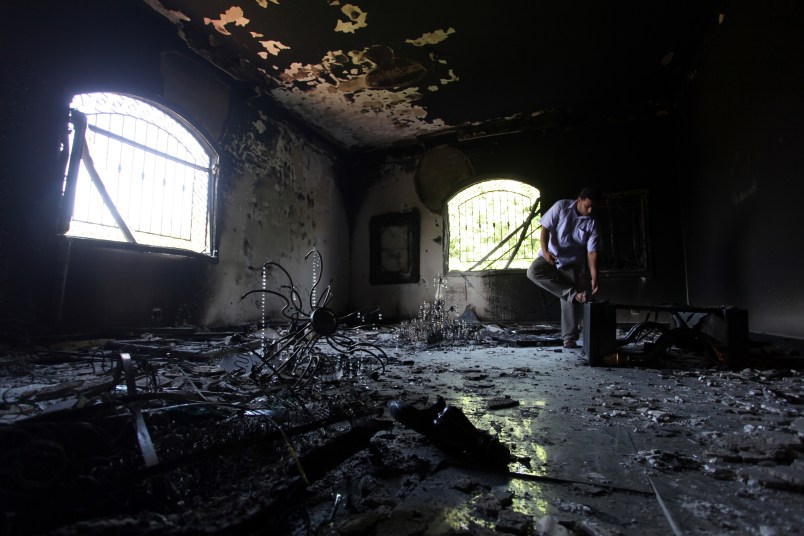The Obama regime’s propaganda about “the video” sparking the attack on the Benghazi compound was so pervasive it even convinced the guy who led the attack. You heard that right. Ahmed Abu Khatallah, the ringleader of the attack that killed four Americans in September 2012, told others at the time he was motivated to attack the compound “to take revenge for an insult to Islam in an American-made online video.”
This reporting isn’t new. But it’s received pretty little attention and it deserves a new round of attention now that Khatallah has been captured and it’s universally agreed by all that he’s the bad guy who ran the whole operation, even if his capture is now supposedly only another futile effort to distract from the investigation into the attack he launched. If that makes sense.
By most reasonable measures this should be a great gotcha moment for Democrats and everyone who’s sickened by how this tacit alliance of cretins and dupes has taken this brutal attack and loss of American lives and strung it up by the lamppost into the partisan clown show it’s become. But then again it’s not.
Khatallah said he was angry about the video and that’s why he did it. Or maybe he made that up for his own reasons. Or maybe he wasn’t in the central player in the attack. The weight of evidence – all the conspiracy theories to the contrary – is that the video did play some significant role in triggering that group of attacks that ended in the death of the four Americans, including Ambassador Chris Stevens. But really, who knows why Khatallah did it or why he said he did it.
The entire premise is frankly ridiculous – first, that it matters and second, that you really have much chance of being right in the first few hours after an ambush about just why something happened or even precisely what happened in an area in which every local crackpot – Khatallah being a prime example – had set up his own mini-Islamic militia and was carousing and enforcing their own claims to tiny patches of turf and also enjoining the right and forbidding the wrong, as they put it.
Overnight I’ve seen various Benghazi enthusiasts (no other word) coming back with, “Well, what would you expect him to say?” or “And you believe him?”
This brings us to another outcropping of the great Benghazi nonsense mountain.
First, on the simplest level, why would this guy, on the night of the event, be telling people it was vengeance for this dingbat video? I know some people ascribe infinite villainy and premonition to anyone with the terrorist label. But he’s trying to spin US domestic politics two years later, two months later?
More telling is that when you step back for a moment you see that this entire controversy only makes any sense, has any consequence, in a very convoluted logic of contentious US domestic politics. If you listen closely to the folks most obsessed with this video controversy you’ll see the assumption that if it’s because of a video, it’s in some sense our fault, we’re the aggressor and terrorists are reacting to us. So if you blame the video you’re blaming America. You’re part of the blame America first crowd. And in the whole theodicy of War on Terror philosophy you’ve got everything upside down. The right thinking is that the terrorists are after us, want to attack us, want to drive us out of the Middle East, kill our civilians, destroy our way of life, maybe re-found the Caliphate.
The other part of the GOP argument about “the tape” has a more plausible premise but still doesn’t hold up – that is that President was campaigning on having al Qaeda “on the run,” so an attack a month before the election was a refutation of this claim. For campaign purposes far better that it be spontaneous and local than planned and coming from the formal al Qaeda apparatus.
It’s worth noting that attacks on the country or its interests on the eve of an election tend to strengthen the incumbent, not weaken him.
But again, the entire obsession about “the video”, something that is factually difficult if not impossible to get to the bottom of, certainly in the first hours after the attack, is a debate entirely ensconced within a mindset, an ideology, a morality play that is firmly rooted in Washington, D.C., and the open terrain of cable news television. I’m pretty confident that if you put this question to actual Islamic radicals, they’d be mystified by the seeming centrality of the tape/no tape debate.
So again, why would he lie on the night of the attack? He probably wouldn’t care or know to because the supposed mammoth importance of the question only makes much sense in the minds of American hawks and Republican partisans, walled off in a Blame America First v. War on Terror psychodrama that just doesn’t make a lot of sense or have much relevance to Islamist mini-militias in Libya or really anywhere else in the Middle East or South Asia.
The tape probably was a trigger. But the whole debate is silly. And it always has been.






